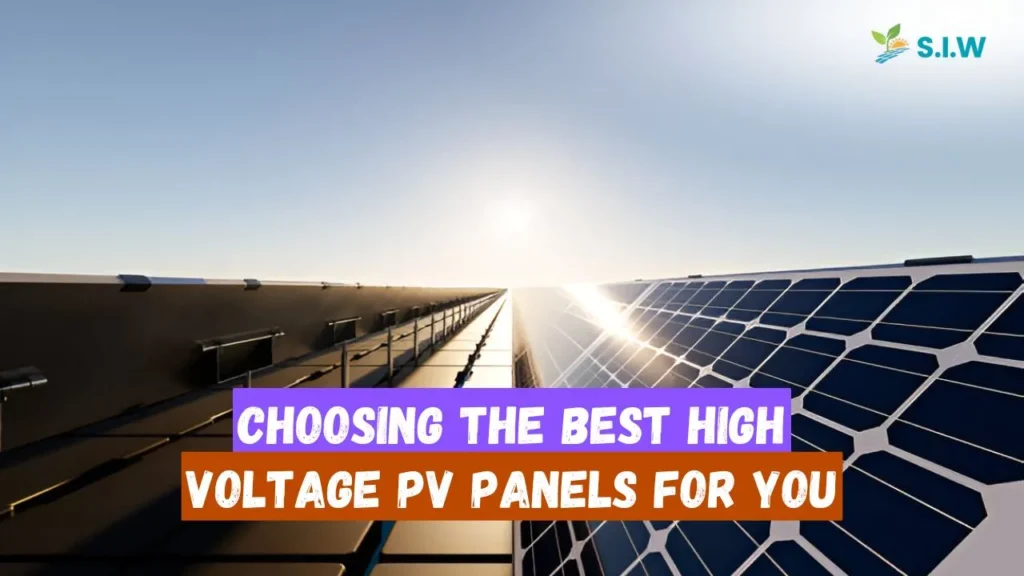As demand for clean, renewable energy grows, more homeowners and businesses are turning to photovoltaic (PV) solar panels as an effective way to reduce electricity costs and lower carbon emissions. But when it comes to installing a PV system, understanding which high-voltage PV panels best suit your needs is essential. High-voltage panels offer increased efficiency, reduced power loss, and optimal output – making them ideal for larger systems or areas with high energy demands. This article covers everything you need to know about selecting the best high-voltage PV panels to help you make a well-informed decision.
1. What Are High Voltage PV Panels?
PV panels, also known as solar panels, convert sunlight directly into electricity using semiconductors. High-voltage PV panels are those with increased voltage output, allowing for greater efficiency in energy transmission and utilization. They are particularly beneficial for large-scale applications or settings where reducing the number of panels is desirable without sacrificing energy output. High-voltage panels typically range from 400V to 1000V, making them suitable for both commercial and residential installations.
2. Why Consider High Voltage Panels for Your Solar System?
High-voltage PV panels are essential for anyone looking to maximize efficiency and reduce losses due to electrical resistance. The main advantages include:
- Greater Efficiency: Higher voltages translate to less power loss across distances.
- Reduced Wiring Requirements: Fewer panels and less wiring can lead to cost savings.
- Suitability for Large Installations: Perfect for properties with higher energy demands or limited space.
- Increased Return on Investment: Reduced maintenance and wiring costs mean a better ROI.
Understanding these benefits can help you decide if high-voltage panels are the right choice for your energy goals.
3. How High Voltage PV Panels Work
High-voltage PV panels operate similarly to standard panels but are designed with higher-efficiency cells and advanced wiring configurations. They produce direct current (DC) electricity, which is then inverted to alternating current (AC) for home or business use. The higher voltage output allows the system to deliver power with minimal loss over distances, making it especially beneficial in large or complex installations where voltage drop could otherwise reduce efficiency.
4. Factors to Consider When Choosing High Voltage PV Panels
Several factors influence which high-voltage PV panels are best suited to your needs. Consider the following:
- System Size and Energy Demand: Larger properties with higher energy demands will benefit most from high-voltage panels.
- Budget and ROI: Higher efficiency panels may cost more initially, but their long-term ROI is often greater due to reduced operational costs.
- Compatibility with Existing Infrastructure: Ensure your electrical system can handle higher voltage panels to avoid compatibility issues.
- Local Climate: High-voltage PV panels can perform differently in various climates, so consider weather patterns when selecting your panels.
5. Types of High Voltage PV Panels
High-voltage PV panels come in a few main types, each with unique characteristics:
- Monocrystalline Panels: Known for high efficiency and durability, monocrystalline panels work well in limited spaces or high-demand setups.
- Polycrystalline Panels: Slightly less efficient than monocrystalline but typically more affordable, suitable for moderate energy needs.
- Thin-Film Panels: These are lightweight and flexible, making them ideal for certain unique applications but often less efficient overall.
Each type has its benefits, but monocrystalline high-voltage panels are commonly preferred for their excellent performance.
6. Understanding Voltage Ratings and Efficiency
When selecting high-voltage PV panels, voltage ratings are crucial. The voltage rating determines how much power can be produced and transported efficiently. Higher voltage ratings are generally linked to lower transmission losses and better overall efficiency, but you must ensure that your other system components, such as inverters, are compatible with these ratings to avoid power mismatches or system malfunctions.
7. Inverter Compatibility with High Voltage Panels
Inverters are responsible for converting DC power generated by PV panels to usable AC power. With high-voltage panels, it’s essential to choose inverters that can handle the increased voltage. Many high-voltage inverters can handle voltages up to 1000V, but always consult with your installer or a certified expert to ensure that your inverter will function optimally with your chosen panels.
8. Installation Requirements and Safety Considerations
High-voltage PV panel installations require specific safety measures:
- Proper Insulation: High voltage requires appropriate insulation to protect against electrical hazards.
- Qualified Installation: Only certified technicians should handle high-voltage panel installations.
- Regular Maintenance: Routine checks can ensure that the panels and wiring are in top shape and reduce risks related to high-voltage systems.
Safety is paramount with high-voltage systems, so make sure to work with experienced professionals.
9. The Cost of High Voltage PV Panels
High-voltage PV panels are typically more expensive than standard panels due to their enhanced efficiency and durability. However, this higher upfront cost can be offset by long-term savings in reduced wiring and energy transmission costs. For most users, high-voltage panels offer a faster payback period compared to lower voltage options due to their efficiency and durability.
10. Maintenance and Longevity of High Voltage PV Panels
Regular maintenance is crucial to ensure your high-voltage PV system operates efficiently. While these systems require minimal upkeep, scheduling regular inspections and cleaning under solar services can help identify issues like dirt buildup or loose connections. High-voltage panels are built for durability, and with proper care, they can last up to 25 years or more, maintaining peak efficiency over time.
Is High Voltage PV Right for You?
Choosing the best high-voltage PV panels depends on your specific energy needs, budget, and installation space. High-voltage panels are ideal for those with higher energy demands, limited installation space, or a preference for more efficient systems. With proper installation, high-voltage PV panels provide long-term cost savings, efficiency, and reduced maintenance needs, making them a solid investment in sustainable energy. Whether for residential or commercial use, high-voltage PV panels offer a smart, environmentally friendly way to meet today’s energy challenges with efficiency and style.








